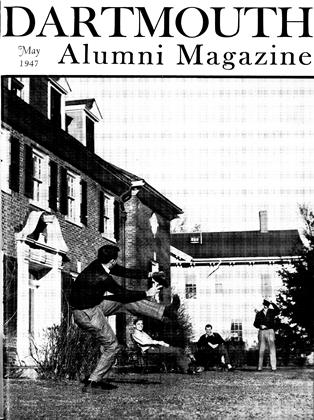JAMES RADCLIFFE SQUIRES, Instructor in English, recently was awarded one of the major prizes in a nation-wide contest sponsored by Voices, A Journal of Poetry for his poem, Ante Te Natum. He has been invited to read the prize-winning offering at the York Club in New York City early this month.
A graduate of the University of Utah and the University of Chicago graduate school, Mr. Squires joined the Dartmouth College faculty last year. He is the editor of the Chicago Review, a literary magazine.
In addition to his prize-winning composition, Mr. Squires has poetry scheduled for publication in Poetry, A Magazine ofVerse and in The Western Review.
ARTIST-IN-RESIDENCE Paul Sample '20 is the recipient of a $1000 prize awarded by the National Academy of Art for his war painting, "Delirium Is Our Best Deceiver," which Mr. Sample belatedly entered in the Academy's national exhibition.
The inspiration for the prize-winning painting came while Mr. Sample was conv alescing in a field hospital in the Philip, pines. Sketches he made there were later used in composing the painting in the United States. The hospital itself had been a cathedral and was being used both for religious services and to shelter the wounded at the time Mr. Sample was a patient there.
A large canvas, the painting uses as its main theme the delirious dreams of the wounded and sick soldiers. Hovering about their prone figures are the illusory figures of women and dogs which represent the wives, sweethearts, pets and other loved ones to whom the thoughts of the delirious men go out.
CITIZENS of Hanover, including Dartmouth College students, have been judged, quite literally, for a little better than a year by a member of the Dartmouth faculty. For Donald -L. Stone, in addition to being Professor of Government and Professor of Business Law, Tuck School, has been Judge of the Hanover Municipal Court since April 23, 1946.
A member of the Dartmouth faculty for 23 years, Professor Stone was appointed to the bench last year by New Hampshire's Gov. Charles M. Dale to succeed Judge Earl Gordon who resigned. Previous to his appointment he had been acting as special justice of the same court.
Professor Stone brings to his judicial duties long and varied experience. In addition to teaching politics and government since 1914, he holds the Ph.B. degree from Brown in 1909, the LL.B. from Harvard in 1912, A.M. from Princeton in 1914 and J.D. from Indiana in 1930. From 1914 to ig23 he taught English, history and politics at Princeton except for service in World War I as a military censor from 1917-1919, being discharged with the rank of major. During the year 1920-21 he was a foreign correspondent for the Chicago Tribune in Paris and Berlin.
After teaching at the Culver Military Academy during the years 1923-24, Profess or Stone joined the Dartmouth faculty in the latter year with the rank of instructor. He was promoted to an assistant professorship in 1926 and was appointed a full professor in 1935.
STEARNS MORSE, Dean of Freshmen, and John Hurd, Professor of English, represented Dartmouth April 11 and 12 at the New England English Conference under the sponsorship of Springfield College, Springfield, Mass., to which more than 30 institutions sent delegates.
As speaker and leader of a conference group, Mr. Morse discussed the problems facing a college professor in teaching American Literature. Since assuming his new duties in the Administration Building, he still teaches two courses in the Department of English, American Fiction to 1900 during the first semester and Representative English, American and Continental Novels during the second semester. Mr. Hurd was Chairman of the Literature Division at the Conference.
A LBERT S. CARLSON, Professor of Geography, spoke on "Economic Aspects of Industrial Advertising" at the 22nd annual conference of the American Industrial Development Council of the U. S. Chamber of Commerce, held at the Statler Hotel, Washington, D. C., late in March. Professor Carlson is also executive secretary of the Dartmouth-Lake Sunapee Region Association and was representing that organization at the meeting.
In his address, Professor Carlson evaluated the significance of industrial advertising as a locational factor, showed how it must be keyed to the economic-geographic resources of the different regions of the nation, and how present types of industrial ads might be improved in light of geographic conditions of region being advertised.
COURT IS IN SESSION: Prof. Donald L. Stone of the Government Department shown presiding as Mu nicipal Judge, with a witness on the stand and Police Chief Andrew Ferguson, left, also present to testify,
 View Full Issue
View Full Issue
More From This Issue
-
 Article
ArticleTHE ALASKA HIGHWAY
May 1947 By LAURENCE W. LOUGEE '29 -
 Article
ArticlePROPAGANDA AND THE CRISIS
May 1947 By MICHAEL E. CHOUKAS '27 -
 Class Notes
Class Notes1918
May 1947 By ERNEST H. EARLEY, DONALD L. BARR -
 Article
ArticleJames Parmelee Richardson
May 1947 By JOSEPH W. GANNON '99 -
 Class Notes
Class Notes1921
May 1947 By DONALD G. MIX, ROBERT M. MACDONALD -
 Class Notes
Class Notes1937
May 1947 By JOHN H. DEVLIN, ARTHUR H. RUGGLES JR.








